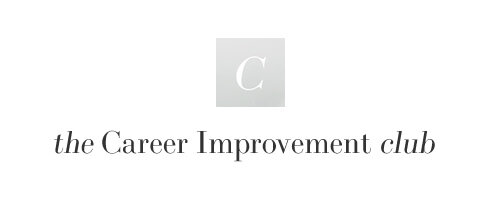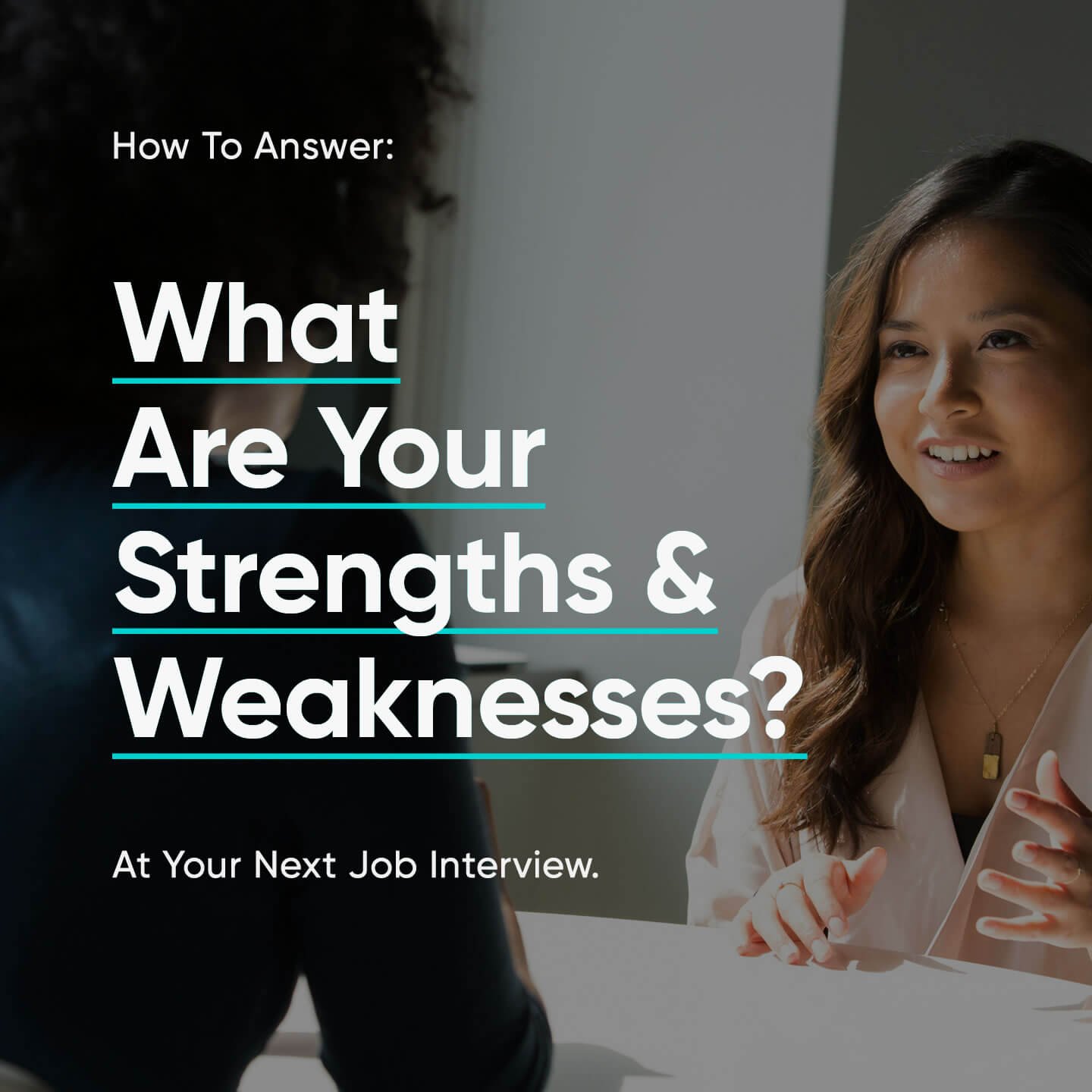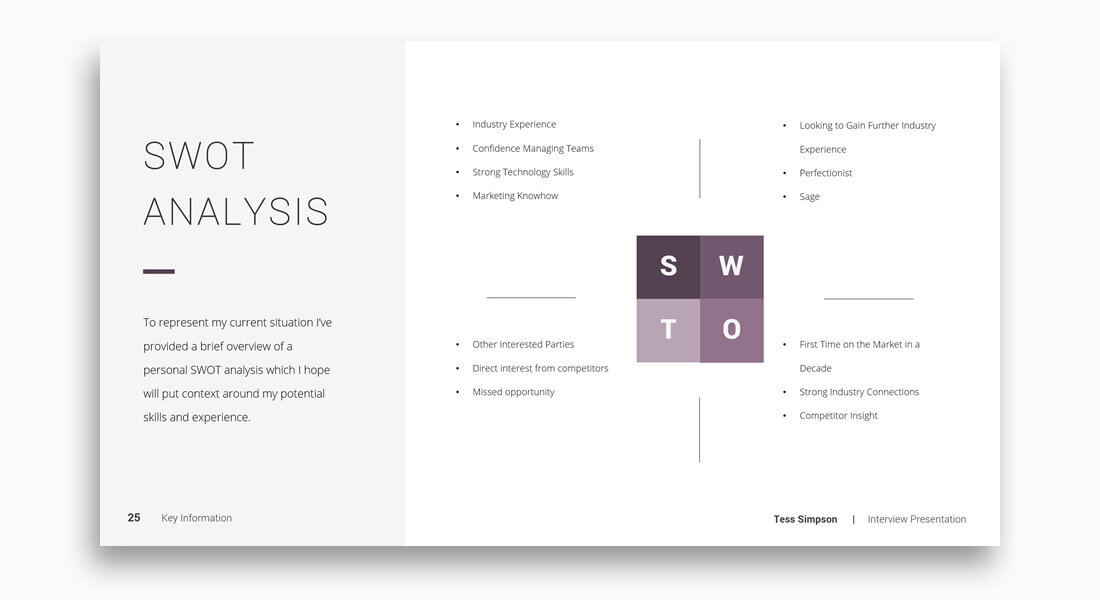Daunting, isn’t it?
When asked the awkward interview question 'what are your strengths and weaknesses?’. You reach for an answer but struggle, your memory goes blank, your palms start to sweat and you blurt out the first words that come to hand – it’s a cringe-worthy answer.
How frustrating. You really wanted this job, and now you’ve lost the golden chance to progress further - back to the job hunt in the morning.
But what if you could master how to answer this question and wow your interviewers with an amazing array of strengths and weaknesses (but mainly strengths, obviously)?
This is possible, with the following, essential interview tips you’ll gain the advice you need.
Why is the Interviewer Asking This Question?
Regardless of the industry, you’re bound to bump into the interview question “what are your strengths and weaknesses”. And if you've ever attended an interview, I’m sure you came across it, or a variation thereof:
What are your greatest strengths?
What attributes will you bring to this position?
What would your co-workers say is your strongest suit?
What self-developmental traits are you currently working on?
If I call your supervisor right now, what would they say is your weakness?
Which areas do you need to work on?
If you could change one thing about yourself, what would it be?
When recruiters are interviewing, their goal is to identify the best candidate for the position. They do so by asking all kinds of questions.
This question specifically aims to gauge your self-awareness, honesty, and confidence. It answers questions like: Is this a self-aware individual? Can they professionally own up to their flaws? Do they learn from their mistakes? Is this someone who can handle positive criticism and use it as a learning opportunity? Do they try to grow?
Your answer to this question aids in gauging how you can fit in the role. Whether your strengths align to the company culture; and if they can handle or work with your weaknesses. This question alone provides great insight into what you bring to the company, and any challenges they might run into with you.
How to answer the interview question 'What are Your Strengths and Weaknesses'?
Most candidates possess the vital traits, but fail to present them convincingly. When asked about their strengths, they get tempted to go overboard and list every positive thing they can think of. Am I a good wrestler? Sure. Let me throw that in. I dedicate 2 hours every day to go to the gym. That’s a strength showing my commitment, right?
Well, no.
These are desirable traits to possess. But do they relate to the role? Unless you are interviewing for a fitness position, such an answer is unrelated to the position and doesn’t show your capabilities.
Another thing, don’t brag too much or be too humble. Dishing out twenty strengths is too much, and you come off as full of yourself. It’s better to list a few authentic strengths than listing hundreds of trivial attributes.
Don't be too humble, either. Some candidates go overboard on not bragging and actually downplay themselves. If you are great at something¸ communicate it. As long as it’s related to the role. Bear in mind that interviews are always an opportunity to sell yourself as the best of the pack.
As for weaknesses, be honest. But wary. And please don’t say you have no professional weaknesses. It’s dishonest and makes interviewers question your integrity, which only hurts your chances. In fact, they expect you to have some faults. After all, you are only human.
Mention those real-life weaknesses that helped you grow professionally. For instance, if your fault is being a perfectionist, state how the trait almost cost you to, say, miss a deadline. As a result, you learned that being on time is as important as doing a great job. Don’t forget to explain the steps you took/are taking to eradicate this weakness.
Furthermore, do not share a weakness unrelated to the job offer or that might be a red flag. A major flaw that can hinder the fulfillment of your duties is a no as it indicates you aren’t the best candidate.
Demonstrate Your Professional Weaknesses by Getting Creative
A picture speaks a thousand words as they say.
As more interviews are done over Zoom, Skype and Teams these days, many candidates are upping their game by turning to professional PowerPoint Presentations to answer interview questions such as “What are your strengths and weaknesses”. Below is a slide example taken from our interview presentation downloads. As you can see below, it really draws attention to what your good at and what needs improving…
Image taken from the following Job Interview Presentation Template
You can really have some fun with this approach as it not only contributes towards answering the interview question but can provide you with some actionable insight which you can take forward and use to improve personally.
Building on this there is also the old favourite the SWOT analysis as highlighted below. With this approach you can demonstrate to employers more than just your strengths and weaknesses and can take it further to describe the opportunities and threats as well. This gives you a chance to really sell yourself and put yourself in real contention.
Image taken from the following Professional Zoom Presentation Template
Having these graphics in your locker is guaranteed to impress your interviewer.
So, How do I Identify My Strengths and Weaknesses?
I’m glad you asked.
Sit down and think deep and thorough about your professional life. What are you good at? What do your employees or bosses praise you for? In what areas are you good at than half your co-workers? What is the one thing you’re struggling with? Which weaknesses have you been informed to possess by your co-workers? What is that one trait that if eliminated, could make you the best? Include soft skills, hard skills, and talents.
Then, pull out the job advert and sift through it. Desirable qualifications are always listed on the job description. Alternatively, research the company to discern the characteristics they value. If you’re still stuck, browse through job advertisements of similar positions on the internet while noting most appearing qualities.
Next off, compare the two lists while taking note of those appearing on both. By now, your strengths have reduced to select few.
After that, recall a story where each specific strength benefited you or the company. Did it save or bring more company money? Did it aid in bringing in more clients? Did you win an awards thanks to it? For each strength, think of a success story and a positive impact it effected.
As for weaknesses, think hard about the hurdles encountered owing to your character. What skills are you struggling with? Be brutally honest here. You know what you’re grappling with. You can ask your co-workers for help as well.
Then think about how it affected your work and the lessons you drew from that situation. Owing to that negative effect, you must have taken some steps to improve and eliminate this problem. List down those steps taken. Or those you are currently taking. The goal is to show that you learned from your mistake and are actively improving and blossoming.
Doing this gives you a rough idea of job-related strengths and weaknesses. Now the final step is to weave in a story for each strength and weakness. By nature, humans grasp concepts better when presented in the form of a story. Since you already have the necessary ideas, weave in an account for the interviewers to absorb better. It also helps authenticate and paint the real picture to the employer.
A good formula to follow in telling your story is the STAR technique. S stands for situation; T for task; A for action and R for results. The situation that required your attention, the task needed to solve this problem, the specific steps you took, and finally, the results reaped from these actions.
Ensure all answers are truthful, accurate, job-related, and aligning with the company’s core values. The facts should be verifiable as most recruiters double check your story. The question almost always sets precedence to a myriad of follow up questions as well. So honesty is the best policy.
4 Examples of ‘Strengths and Weaknesses’ Answers
Example Answer 1: Strength
My greatest strength is time management. I utilize every second well, and it has boosted my career. I remember one time we had an influx of projects in the company. I was tasked with handling double the workload. I scheduled my time and assigned specific timelines to complete each project. By the end of the designated time, I had completed all the projects. My boss was satisfied with the results, and we never missed any deadline.
Example Answer 2: Strength
I yearn to learn as much as possible. As a result, I am always willing to take on tough projects nobody wants to be a part of. I found that such projects teach and spur my growth the most. This has helped me flourish in my career. I don’t mind stepping in and helping out the company whenever needed while gaining valuable skills.
Example Answer 3: Weakness
I am incredibly shy, which holds me back from sharing ideas in meetings and gatherings. I fear to blurt out a wrong answer. But after my team failed to meet weekly goals, I swore to speak out when having amazing ideas. I signed up for an improv class and began initiating conversations. I slowly started crawling out of my cocoon and now can comfortably share ideas. I did share one who solved a problem we had been battling with for long.
Example Answer 4: Weakness
I am a perfectionist. I always labor over the tiniest details. I remember one time this trait almost cost me. I concentrated too much on the specifics forcing me to work double the regular time.
As a consequence, I almost missed the deadline. This experience was a wake-up call. Since then, I have learned to find the balance between being timely and perfect.
Wrapping it up
The strengths and weaknesses question can be the hardest to answer, yet it is vital when making an employment decision. Preparing for the dreaded 'what are your strengths and weaknesses' question beforehand gives you an upper hand and places you in a better position to display how a great fit of the job you are.
Hopefully this information will help you nail that interview and set you on your way to an awesome new career. Now, to be ultimately prepared be sure to take a look at:
As Benjamin Franklin once said “by failing to prepare, you are preparing to fail”.
Good Luck people!
Article updated on the 7th October 2024







